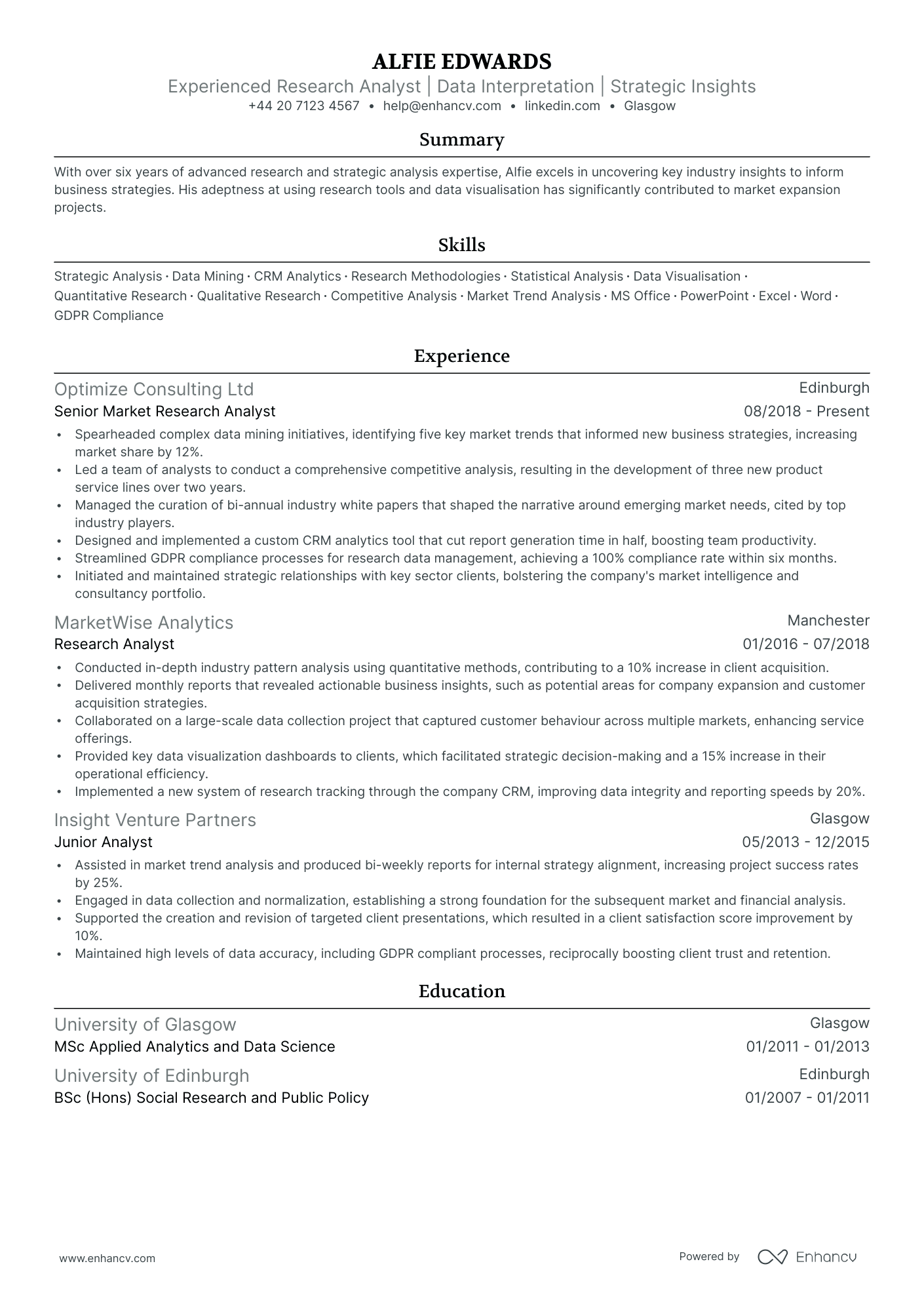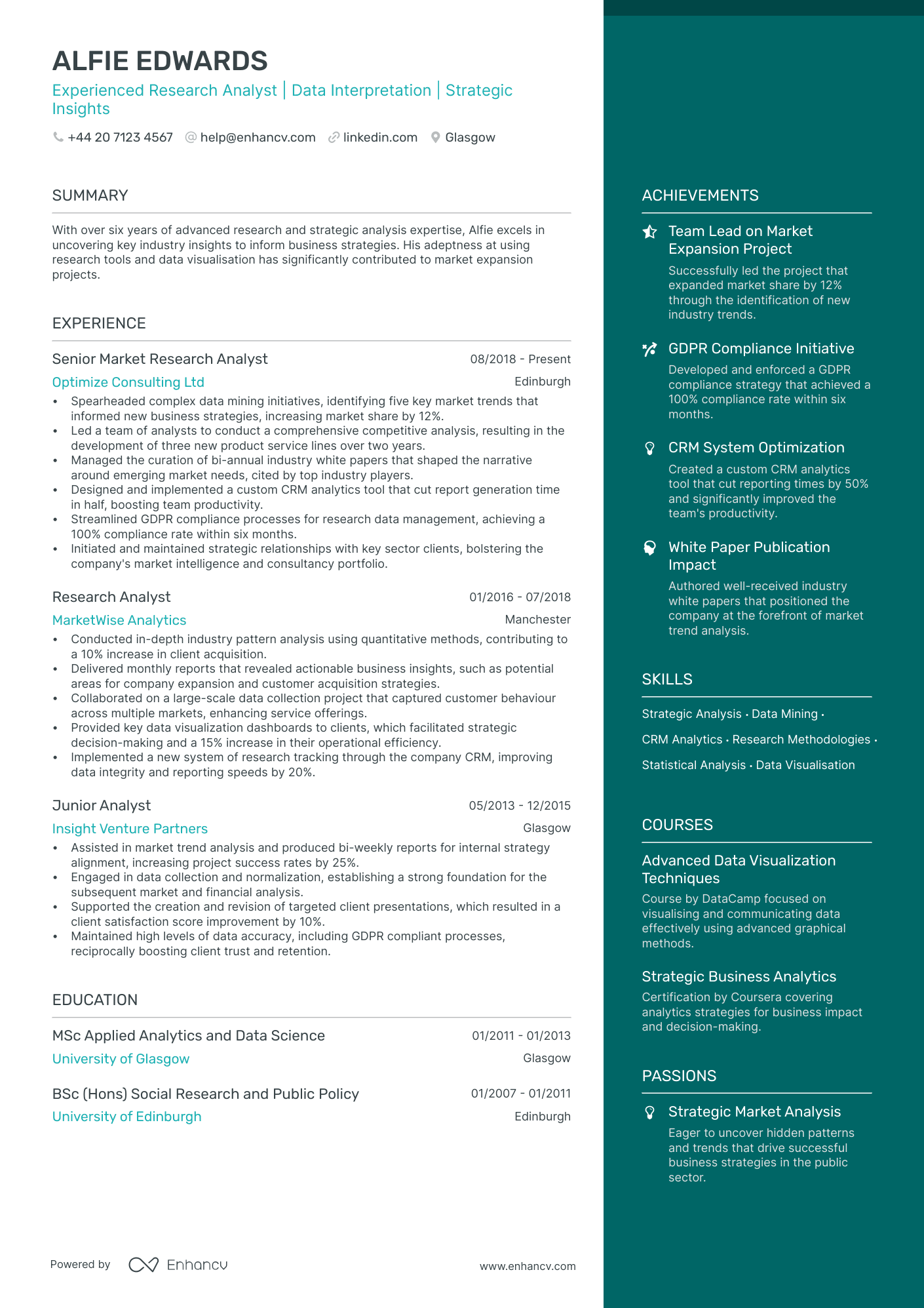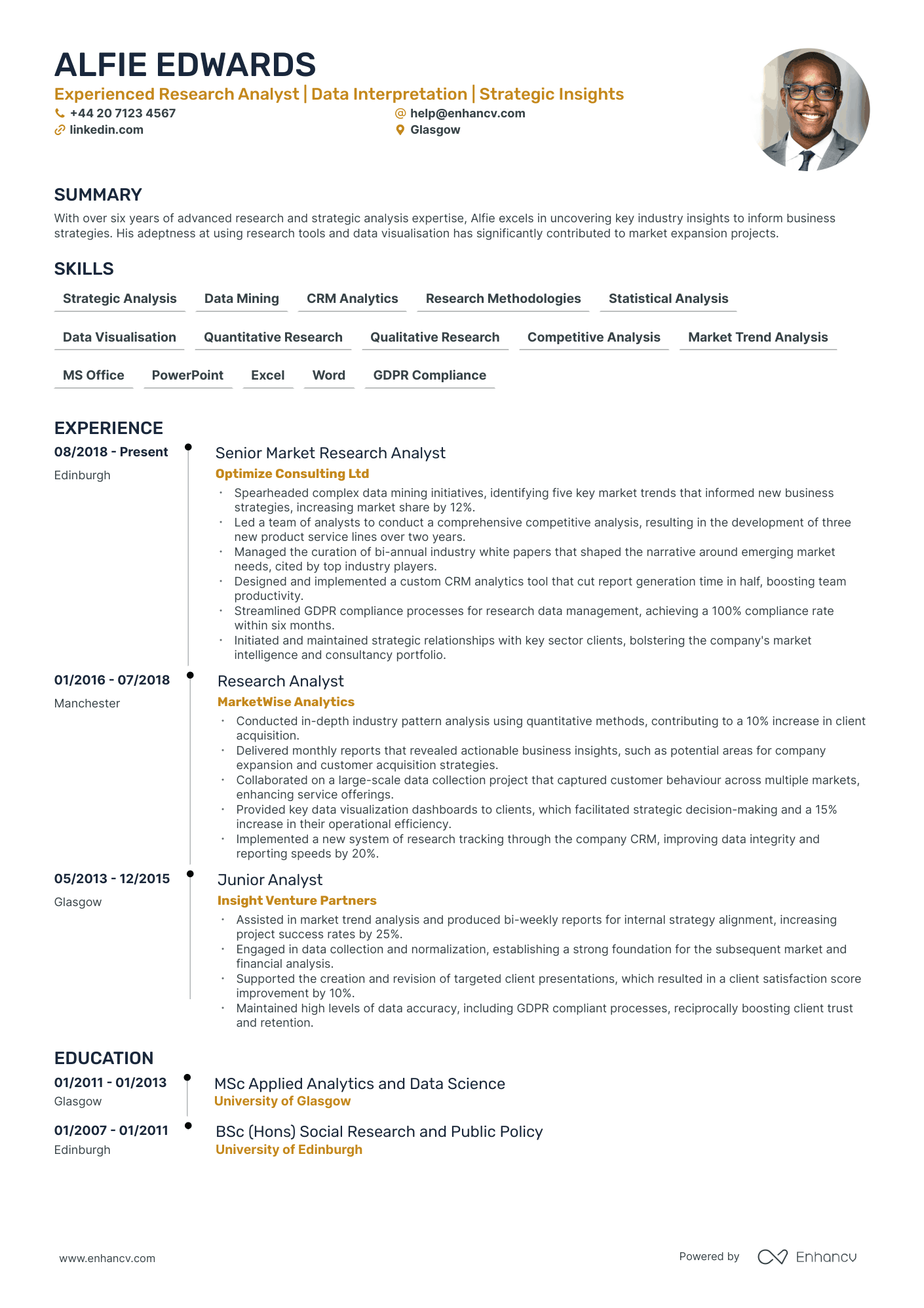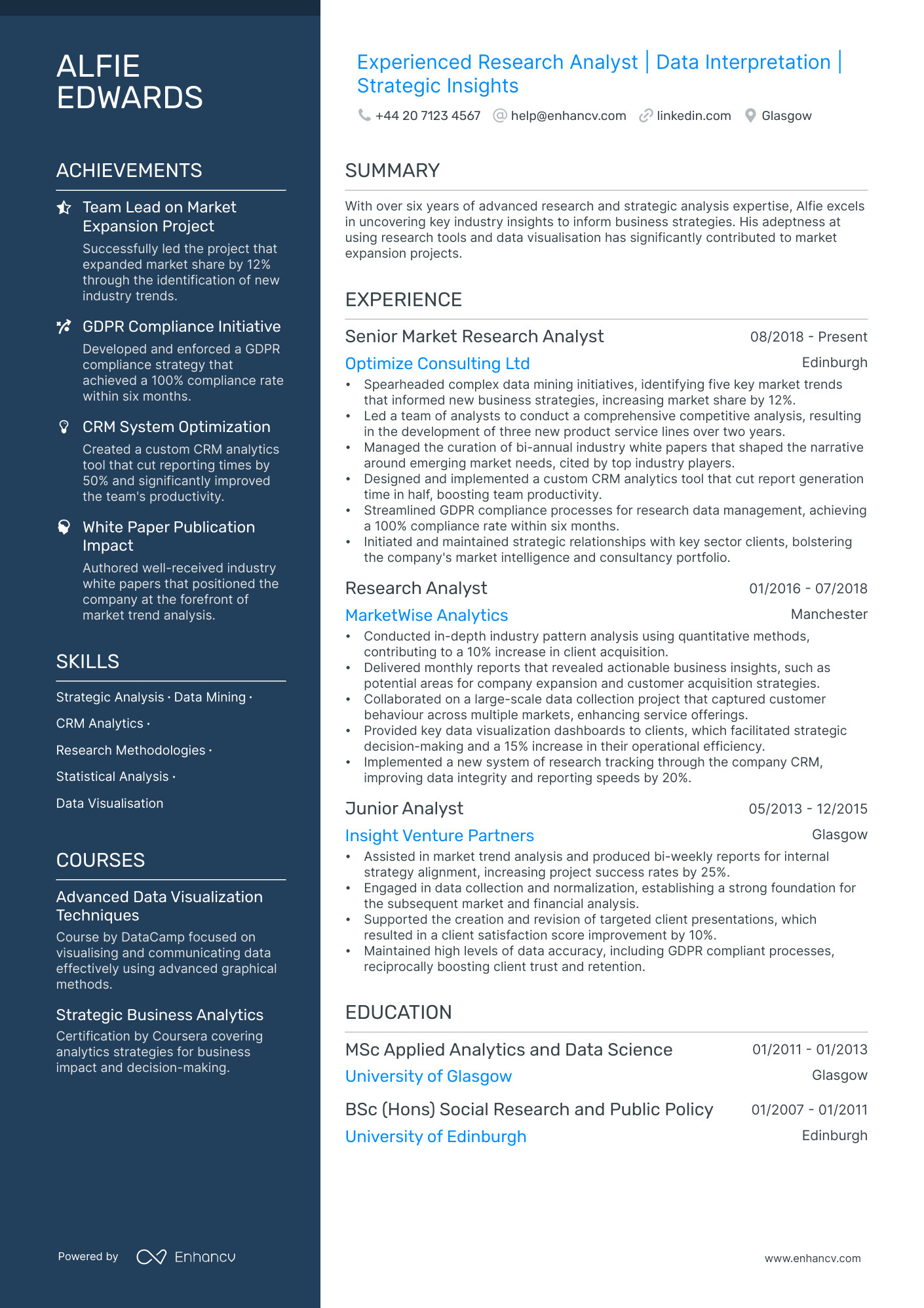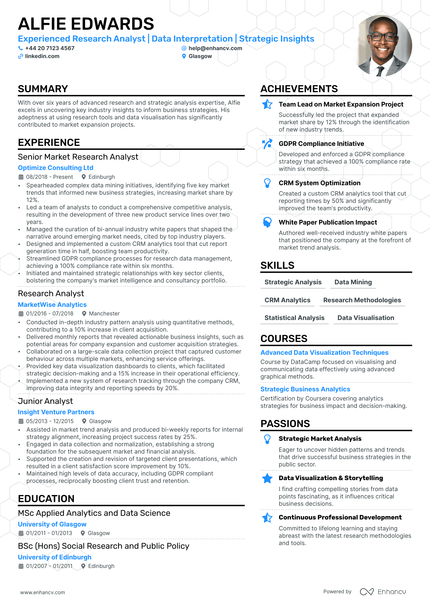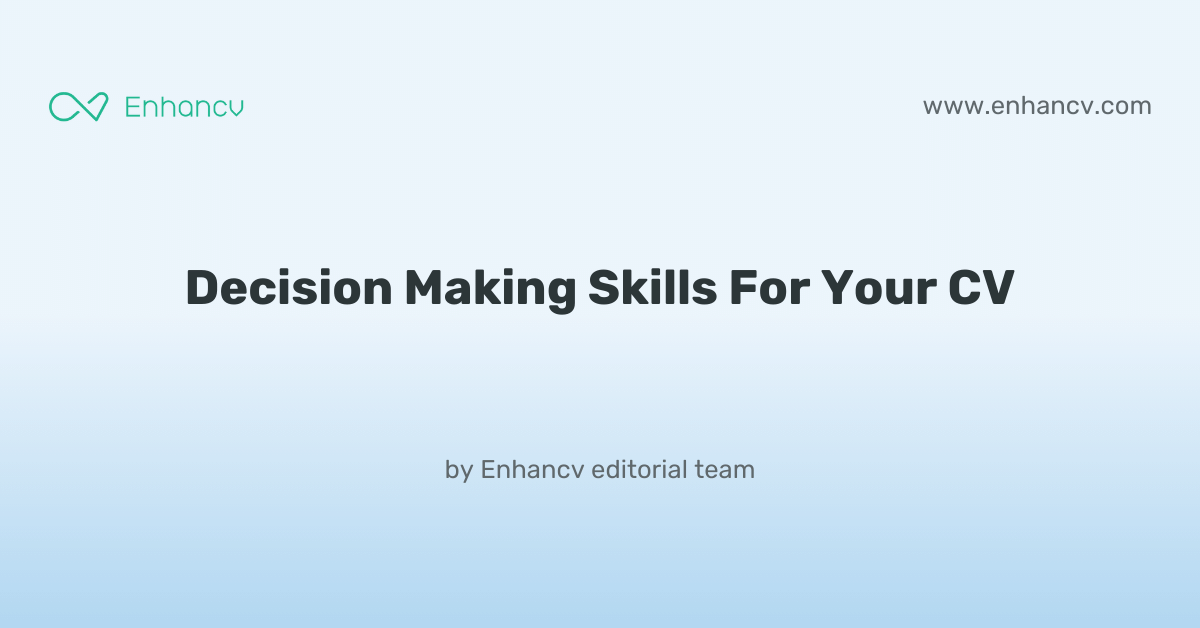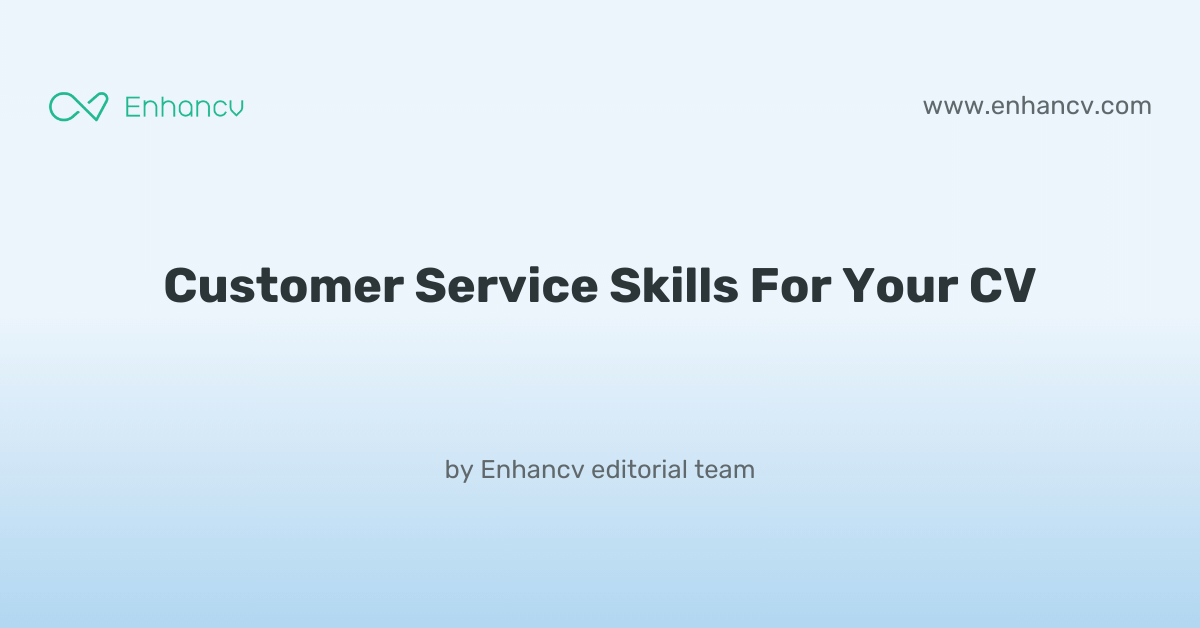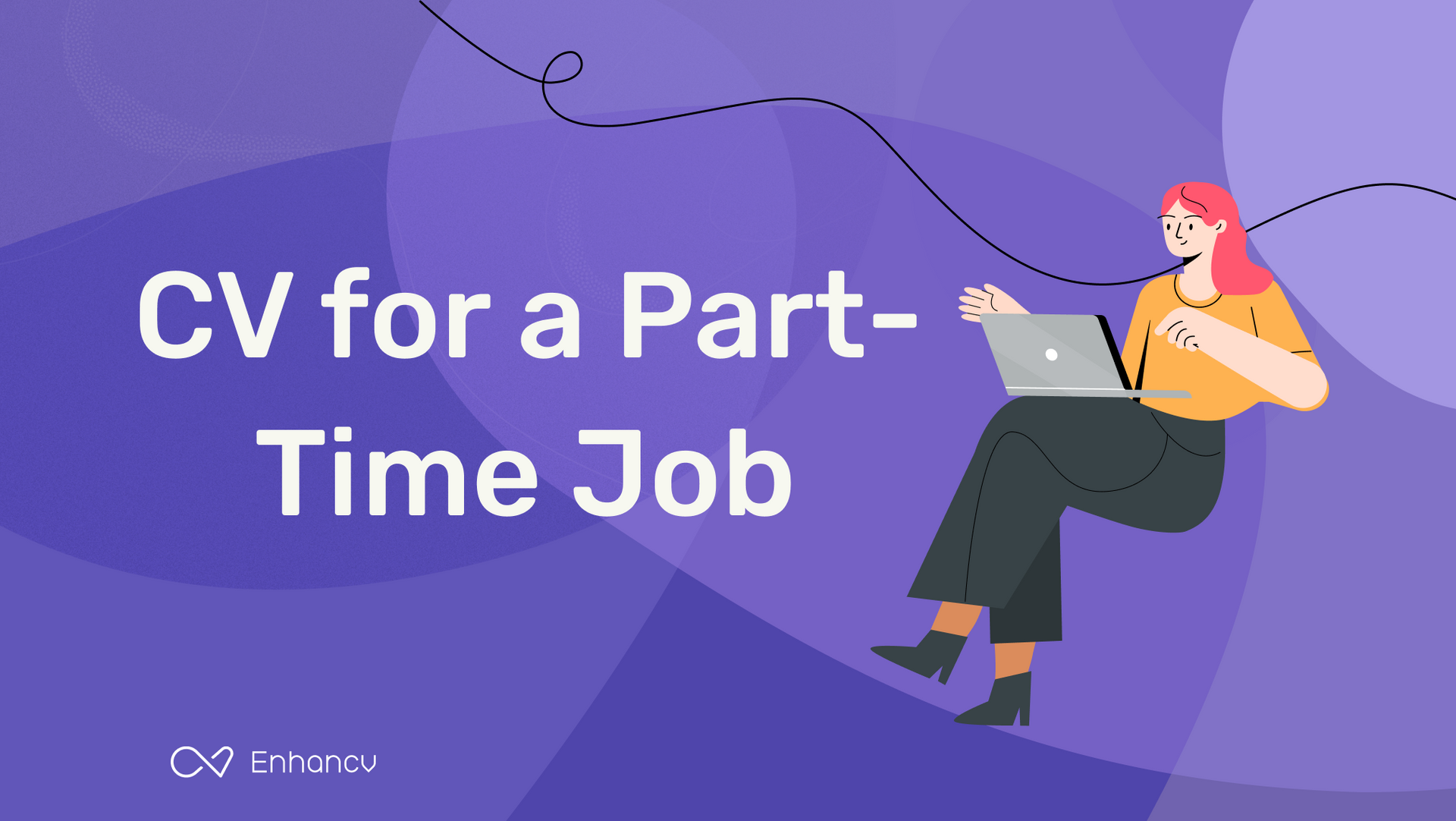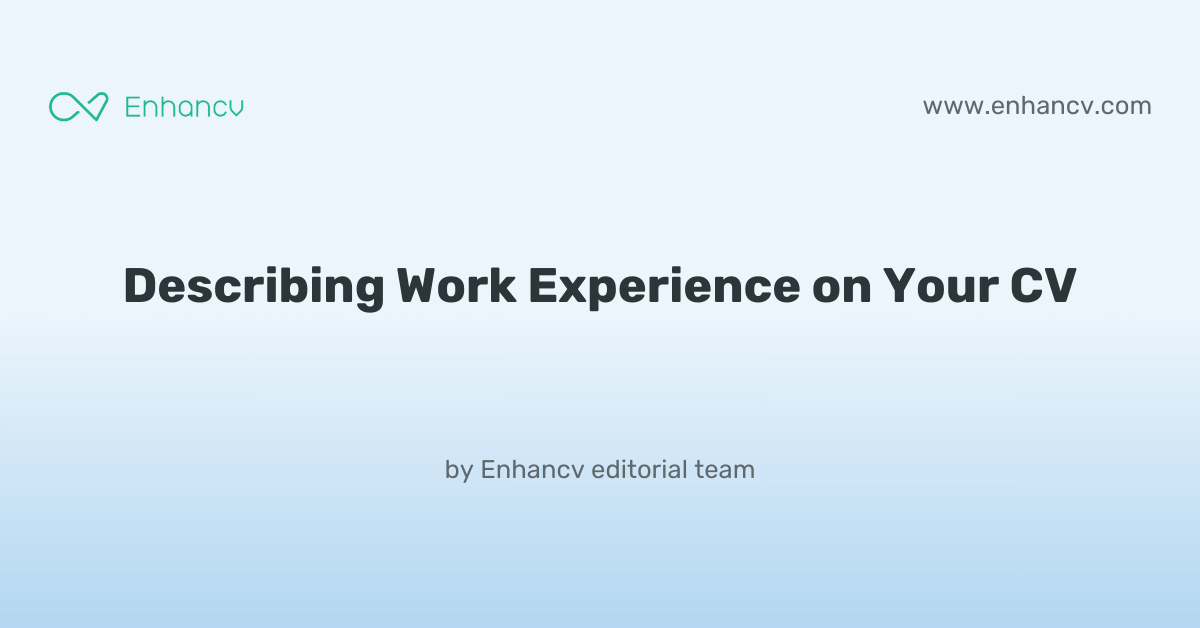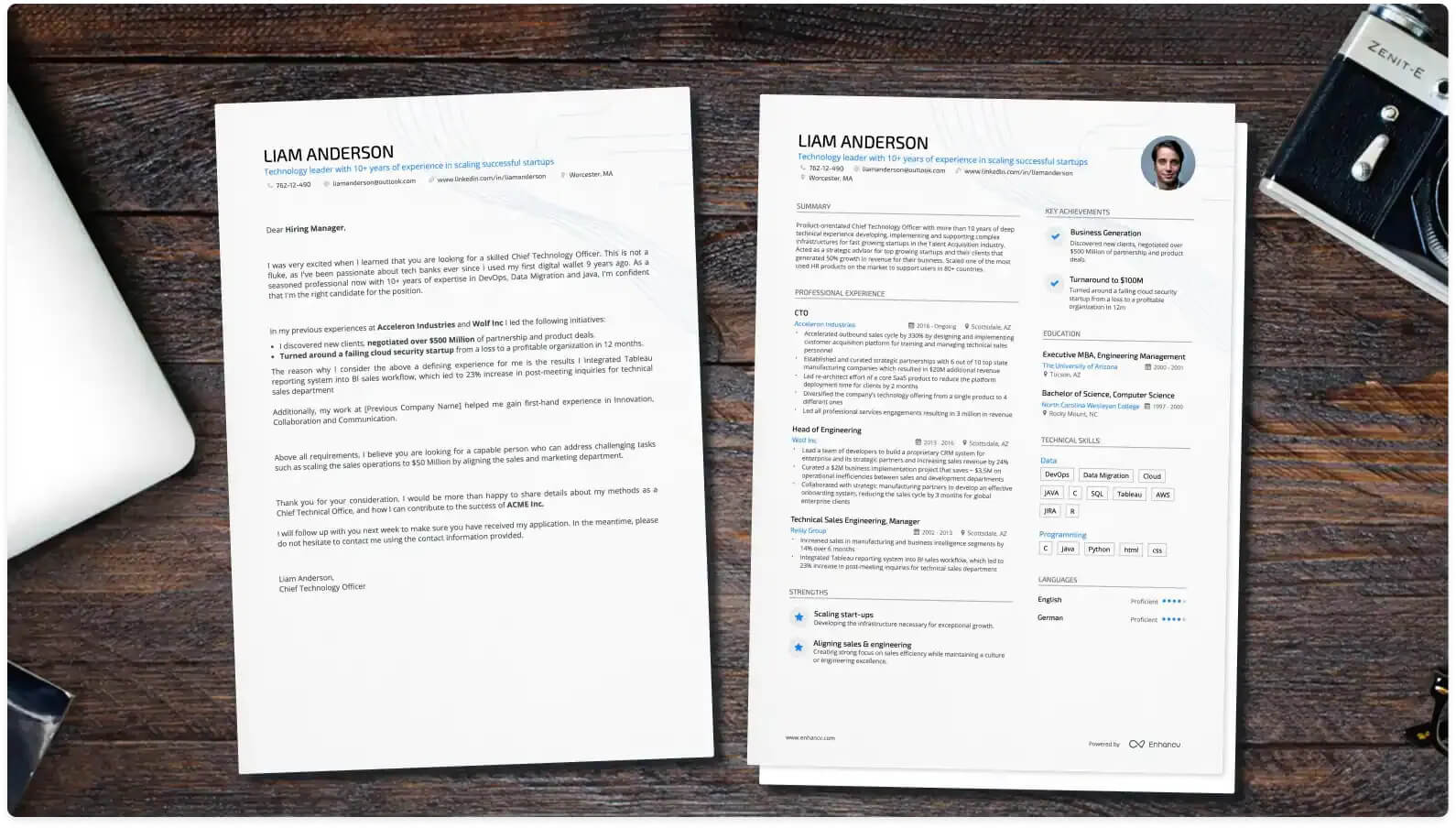Finding adequate, unbiased datasets can be a daunting CV challenge due to the complexity and diversity of visual data required for accurate model training. Our comprehensive guide provides strategies to help you curate and augment datasets, ensuring your computer vision projects are both robust and ethically sound.
- Create an attention-grabbing header that integrates keywords and includes all vital information;
- Add strong action verbs and skills in your experience section, and get inspired by real-world professionals;
- List your education and relevant certification to fill in the gaps in your career history;
- Integrate both hard and soft skills all through your CV.
Discover more industry-specific guides to help you apply for any role in the links below:
Structuring your researcher CV layout: four factors to keep in mind
There are plenty of best practices out there for your CV layout and design. At the end of the day, a clear format and concise CV message should be your top priority. Use your CV design to enhance separate sections, bringing them to the forefront of recruiters' attention. At the same time, you can write content that:- Follows the reverse chronological order in the experience section by first listing your most recent jobs;
- Incorporates your contact information in the header, but do skip out on the CV photo for roles in the UK;
- Is spotlighted in the most important sections of your CV, e.g. the summary or objective, experience, education, etc. to show just how you meet the job requirements;
- Is no longer than two-pages. Often, the one-page format can be optimal for your researcher CV.
Before submitting your CV, you may wonder whether to export it in Doc or PDF. With the PDF format, your information and layout stay intact. This is quite useful when your CV is assessed by the Applicant Tracker System (or the ATS) . The ATS is a software that scans your profile for all relevant information and can easily understand latest study on the ATS , which looks at your CV columns, design, and so much more.
PRO TIP
Use font size and style strategically to create a visual hierarchy, drawing the reader's eye to the most important information first (like your name and most recent job title).
The top sections on a researcher CV
- Education background is essential, showcasing degrees pertinent to research.
- Research experience highlights relevant projects and your role within them.
- Publications list demonstrates contributions to the scientific community.
- Skills section outlines technical and analytical capabilities.
- Conference presentations show communication skills and subject matter engagement.
What recruiters value on your CV:
- Highlight your research achievements by listing publications, presentations, and any notable research projects you've led or contributed to, ensuring that the most impactful items are clearly emphasised.
- Include a detailed skills section that showcases your proficiency with research methodologies, statistical software, lab techniques, or other tools and languages pertinent to your field of research.
- Provide an overview of your research interests and objectives at the beginning of your CV to give potential employers insight into your academic focus and future research direction.
- Document any grants, scholarships, or funding you have successfully secured to demonstrate your ability to attract financial support for research endeavours, along with the amounts, if substantial.
- Mention any experience with peer review, editorial responsibilities or scientific committee memberships to highlight your involvement and recognition within the research community.
Recommended reads:
Making a good first impression with your researcher CV header
Your typical CV header consists of Your typical CV header consists of contact details and a headline. Make sure to list your professional phone number, email address, and a link to your professional portfolio (or, alternatively, your LinkedIn profile). When writing your CV headline , ensure it's:
- tailored to the job you're applying for;
- highlights your unique value as a professional;
- concise, yet matches relevant job ad keywords.
You can, for examples, list your current job title or a particular skill as part of your headline. Now, if you decide on including your photo in your CV header, ensure it's a professional one, rather than one from your graduation or night out. You may happen to have plenty more questions on how to make best the use of your CV headline. We'll help you with some real-world examples, below.
Examples of good CV headlines for researcher:
- "Senior Data Scientist | Machine Learning Expert | PhD in Computer Science | 10+ Years of Experience"
- "Postdoctoral Research Fellow | Immunology and Infectious Diseases Specialist | Published Author | 5 Years of Post-PhD Work"
- "Clinical Research Associate | Oncology Trials Coordinator | GCP Certified | 3 Years of Field Experience"
- "Lead Environmental Scientist | Climate Change Impact Assessor | MSc Environmental Science | 15 Years' Professional Insight"
- "Junior Materials Engineer | Nanotechnology Innovator | MEng in Materials Science | 2 Years Industrial Exposure"
- "Principal Statistician | Biostatistics and Public Health Analyst | PhD Statistics | 20+ Years of Expertise"
What's the difference between a researcher CV summary and objective
Why should it matter to you?
- Your researcher CV summary is a showcasing your career ambitions and your unique value. Use the objective to answer why your potential employers should hire you based on goals and ambitions. The objective is the ideal choice for candidates who happen to have less professional experience, but still meet some of the job requirements.
Before you select which one will be more relevant to your experience, have a look at some industry-leading CV summaries and objectives.
CV summaries for a researcher job:
- Dynamic bioinformatics specialist with over a decade of experience, skilled in next-generation sequencing and big data analytics. Distinguished by a landmark publication in 'Nature Genetics' revolutionising genome-wide association studies and awarded the 2021 Bioinformatics Excellence Prize.
- Seasoned marine biologist transitioning to computational biology, bringing forward 8 years of oceanic ecosystem expertise. Proficient in Python and data modelling, with a strong track record in peer-reviewed publications focussing on coral bleaching recovery mechanisms. Eager to apply marine life data analysis to genomic research.
- Electrical engineer with a 12-year career at blue-chip technology firms pivoting to machine learning research. Expertise in algorithm development complemented by published works on AI applications in smart grids. Recent completion of an MSc in Artificial Intelligence with distinction from the University of Edinburgh.
- An accomplished materials scientist with upwards of 15 years' experience, specialising in polymer nanocomposites. Holder of 10 patents, with significant contributions to advancing lightweight materials for aerospace applications. Recognised with the Innovative Materials Award in 2022.
- Recent physics graduate from University of Manchester, deeply fascinated by quantum computing. Demonstrated keen aptitude through undergraduate research project on quantum algorithms. Eager to translate theoretical knowledge into practical advancements by contributing to a team pioneering in quantum technologies.
- Motivated recent master's degree recipient in computational neuroscience from the University of Cambridge. Committed to understanding neural network modelling and cognitive function enhancement. Aspires to join a research group dedicated to pushing the boundaries of artificial intelligence and human-computer interface development.
How to meet job requirements with your researcher CV experience
We've now reached the essence of your actual CV - your experience section. This is the space where you can list your career roles and on-the-job successes. Many candidates tend to underestimate just how much time and effort they should put into writing this CV section. Your experience shouldn't be a random list of your responsibilities, but instead:
- Match the job description with your skills, values, and accomplishments;
- Start each bullet with a strong action verb, followed up with one key skill and your outcome of applying this skill;
- Spotlight parts of your career history that are relevant to the job you're applying for.
Before we move on, make sure to check out some professional CV experience sections.
Best practices for your CV's work experience section
- Highlight key research projects and include your role, the objectives, the methodology employed, and any significant outcomes or contributions that resulted from the project.
- Detail any publications with citation information, indicating your contribution to each work, such as first author, co-author, or contributor.
- Specify any grants or scholarships you've attained, including details about the funding body, the value of the grant, and the purpose of the funding.
- Include presentations and posters at conferences, the date, location, and the title of the presentation to underscore your active participation in the academic community.
- Explain any teaching or supervisory experience, including course names, levels taught (undergraduate, postgraduate, etc.), and any innovations or improvements you introduced.
- List technical and laboratory skills that are relevant to your field of research, providing examples of techniques you've mastered or equipment you've used.
- Describe any peer review or editorial experience for academic journals or conferences, which highlights your reputation within the research community.
- Include involvement in professional societies or organisations related to your field, showcasing your networking and collaborative efforts.
- Mention soft skills such as project management, teamwork, and communication, giving relevant examples of how these have been applied in a research context.
- Lead interdisciplinary research team in biotechnology, overseeing a budget of $1.5M, resulting in 2 patents and a 30% acceleration in product development.
- Developed novel analytical methods that increased detection sensitivity by 25%, enhancing product quality and safety standards.
- Authored and co-authored 15 peer-reviewed scientific papers that contributed to the company's reputation as a leader in pharmaceutical research.
- Conducted comprehensive market analyses that identified new market opportunities and influenced the strategic planning process.
- Collaborated with cross-functional teams to develop and refine data collection methodologies, improving data accuracy by 20%.
- Presented research findings to stakeholders through detailed reports and presentations that advised on investment strategies.
- Assisted in the design and execution of clinical trials, contributing to a 15% increase in trial efficiency through process improvements.
- Managed data entry and analysis for over 10 studies, ensuring accuracy and compliance with regulatory standards.
- Supported grant writing efforts that secured $500,000 in funding for ongoing research projects.
- Designed and prototyped new materials for solar panels, increasing energy efficiency by 10% over previous models.
- Led a team of junior researchers in a project to reduce manufacturing costs, ultimately saving the company $200,000 annually.
- Maintained active collaboration with industry partners to integrate cutting-edge technologies into the development of sustainable products.
- Spearheaded a research project that discovered a new compound reducing the progression of neurodegenerative diseases in preclinical models.
- Implemented machine learning algorithms to analyze large datasets, reducing analysis time by 40% and identifying key biological markers.
- Facilitated knowledge transfer sessions with project teams to ensure the application of best practices in scientific research.
- Analyzed consumer behavior trends, delivering insights that contributed to a 15% improvement in product targeting.
- Utilized advanced statistical techniques to validate data integrity and provide a reliable foundation for business decisions.
- Played a pivotal role in a team that successfully launched a new analytics software, leading to a 20% increase in departmental efficiency.
- Orchestrated the deployment of environmental monitoring systems across various ecosystems, significantly enhancing data collection accuracy.
- Conducted in-depth data analyses that informed governmental policy on sustainable land use and conservation efforts.
- Authored a comprehensive research report that influenced a major corporate client's decision to invest in green technologies.
- Coordinated multi-center research studies, optimizing the protocols to standardize practices across teams and improve overall data quality.
- Managed a research portfolio of $3 million, ensuring projects adhered to budget constraints and timelines.
- Mentored junior researchers and provided ongoing education in research methodologies, resulting in higher productivity and research output.
What to add in your researcher CV experience section with no professional experience
If you don't have the standard nine-to-five professional experience, yet are still keen on applying for the job, here's what you can do:
- List any internships, part-time roles, volunteer experience, or basically any work you've done that meets the job requirements and is in the same industry;
- Showcase any project you've done in your free time (even if you completed them with family and friends) that will hint at your experience and skill set;
- Replace the standard, CV experience section with a strengths or achievements one. This will help you spotlight your transferrable skills that apply to the role.
Recommended reads:
PRO TIP
Include examples of how you adapted to new tools, environments, or work cultures, showing your flexibility.
Mix and match hard and soft skills across your researcher CV
Your skill set play an equally valid role as your experience to your application. That is because recruiters are looking for both:
- hard skills or your aptitude in applying particular technologies
- soft skills or your ability to work in a team using your personal skills, e.g. leadership, time management, etc.
Are you wondering how you should include both hard and soft skills across your researcher CV? Use the:
- skills section to list between ten and twelve technologies that are part of the job requirement (and that you're capable to use);
- strengths and achievements section to detail how you've used particular hard and soft skills that led to great results for you at work;
- summary or objective to spotlight up to three skills that are crucial for the role and how they've helped you optimise your work processes.
One final note - when writing about the skills you have, make sure to match them exactly as they are written in the job ad. Take this precautionary measure to ensure your CV passes the Applicant Tracker System (ATS) assessment.
Top skills for your researcher CV:
Data Analysis
Research Design
Statistical Software Proficiency
Technical Writing
Literature Review
Laboratory Skills
Qualitative and Quantitative Methods
Data Presentation
Project Management
Subject Matter Expertise
Critical Thinking
Problem Solving
Communication
Attention to Detail
Time Management
Adaptability
Teamwork
Creativity
Persistence
Ethical Judgement
PRO TIP
Order your skills based on the relevance to the role you're applying for, ensuring the most pertinent skills catch the employer's attention first.
CV education and certificates: your academic background as proof of your skill set
A common misconception about your researcher CV education is that you only need it, if you have less professional experience. That is completely false. The CV education section serves to back up your technical (and sometimes personal) capabilities, fill in gaps in your work history, and show you have the initial industry background and know-how. When creating your education section:
- List your degrees in the reverse chronological order, starting with the most recent (and relevant) ones first;
- Include your degree and university names, start and graduation dates. It's optional to also denote you received a "First-Class Honours" for diplomas that are more relevant to the role;
- Curate your relevant university coursework, projects, or thesis work if you happen to have less professional expertise and need to integrate more job keywords and skills.
Your professional qualifications don't need to stop at your academic background. It's advisable to also select up to three of your most noteworthy (and relevant) industry certificates and feature them in a dedicated section. Once more, include the certificate name, the institution that issued it out, and the date you obtained it on. You could feature both hard skills and soft skills certificates, as in the examples below:
PRO TIP
If you have received professional endorsements or recommendations for certain skills, especially on platforms like LinkedIn, mention these to add credibility.
Recommended reads:
Key takeaways
What matters most in your researcher CV-writing process is for you to create a personalised application. One that matches the role and also showcases your unique qualities and talents.
- Use the format to supplement the actual content, to stand out, and to ensure your CV experience is easy to comprehend and follows a logic;
- Invest time in building a succinct CV top one third. One that includes a header (with your contact details and headline), a summary or an objective statement (select the one that best fits your experience), and - potentially - a dedicated skills section or achievements (to fit both hard skills and soft skills requirements);
- Prioritise your most relevant (and senior) experience closer to the top of your CV. Always ensure you're following the "power verb, skill, and achievement" format for your bullets;
- Integrate both your technical and communication background across different sections of your CV to meet the job requirements;
- List your relevant education and certificates to fill in gaps in your CV history and prove to recrutiers you have relevant technical know-how.
